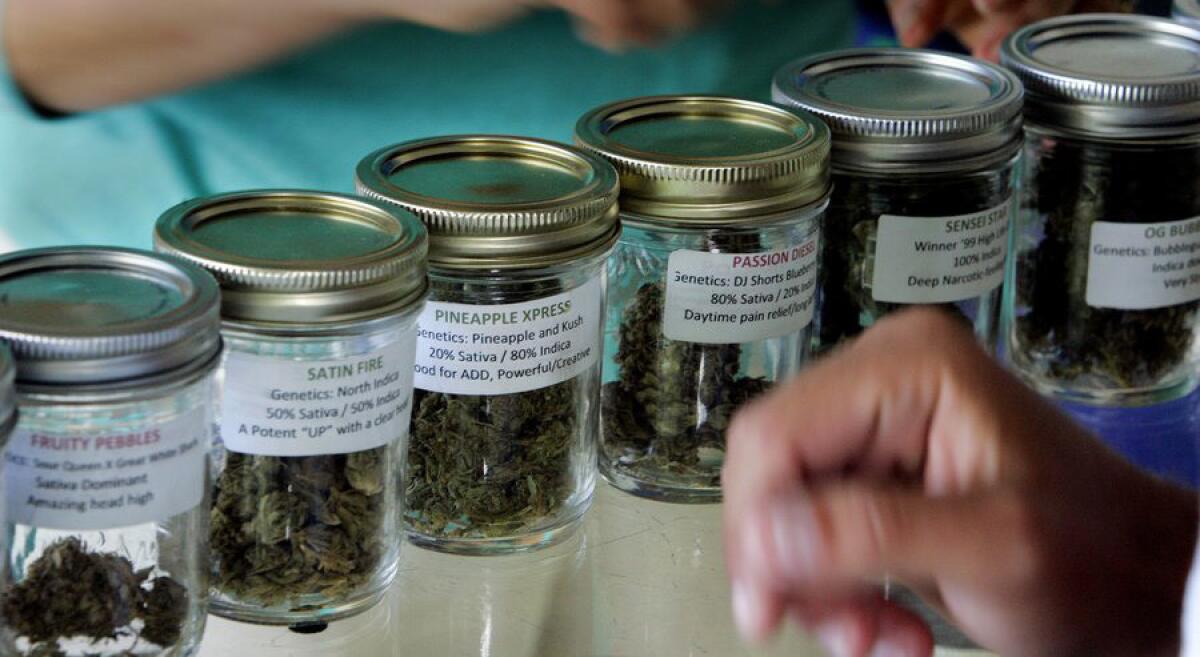Feds can’t spend money to prosecute people who comply with state medical pot laws, court rules

- Share via
A U.S. appeals court decided unanimously Tuesday that the federal government may not prosecute people who grow and distribute medical marijuana if they are complying with state laws.
Congress in the last two years has banned the federal government from spending money in ways that would thwart state medical marijuana laws.
The U.S. Deptartment of Justice contended the ban did not undermine its right to prosecute growers and distributors under federal law, even in states where medical cannabis was legal.
But in the first federal appellate decision on the subject, the U.S. 9th Circuit Court of Appeals said the ban prevents the government from spending money on prosecutions of people whose marijuana activities were legal in their states.
Still, the ruling was not a complete victory for medical marijuana activists.
Rather than simply ordering lower courts to dismiss criminal charges, the 9th Circuit said defendants must be given the opportunity to show their actions complied with state law.
The court decision involved 10 appeals brought by dispensaries and growers in California and the state of Washington.
While marijuana remains illegal under federal law, the congressional bans — in the form of appropriation riders passed annually — stymie the government’s efforts to close down dispensaries, the court said.
Tuesday’s ruling affects only the Western states and territories of the 9th Circuit, but the decision is likely to influence other circuits. Dozens of states authorize cannabis for medical use
Judge Diarmuid F. O’Scannlain, writing for the court, warned that the the law remains subject to change by Congress.
“Congress could appropriate funds for such prosecutions tomorrow,” the Reagan appointee wrote.
“Conversely,” he said, “this temporary lack of funds could become a more permanent lack of funds if Congress continues to include the same rider in future appropriations bills.”
The federal government could appeal Tuesday’s decision to a larger panel of the 9th Circuit or up to the U.S. Supreme Court.
“I hope this is the beginning of the end of federal prosecutions of state medical marijuana dispensary operators, growers and patients,” said Marc J. Zilversmit, who represented a Los Angeles dispensary in one of the cases before the court.
The federal government recently dropped a civil forfeiture action against a huge medical cannabis dispensary in Oakland, but Zilversmit said the Department of Justice has fought hard to continue with criminal prosecutions.
One of the cases before the court involved five defendants accused of running four marijuana stores in Los Angeles County and growing the plants at indoor locations in Los Angeles and San Francisco.
Four other defendants were charged with manufacturing marijuana after authorities said they found 30,000 plants on 60 acres of land in Fresno County.
In Washington, five people were charged with growing more than 562 marijuana plants.
The defendants argued that the federal government was spending money that was not appropriated by Congress in violation of the Appropriations Clause of the Constitution.
They will now be entitled to present evidence in court to try to show that state laws authorized their actions.
O’Scannlain called the problems with the prosecutions “temporal.”
“The government had authority to initiate criminal proceedings, and it merely lost funds to continue them,” he wrote.
Twitter: @mauradolan
UPDATES:
2:36 p.m.: This article was updated with additional details from the decision.
This article was originally published at 1:20 p.m.
More to Read
Sign up for Essential California
The most important California stories and recommendations in your inbox every morning.
You may occasionally receive promotional content from the Los Angeles Times.










